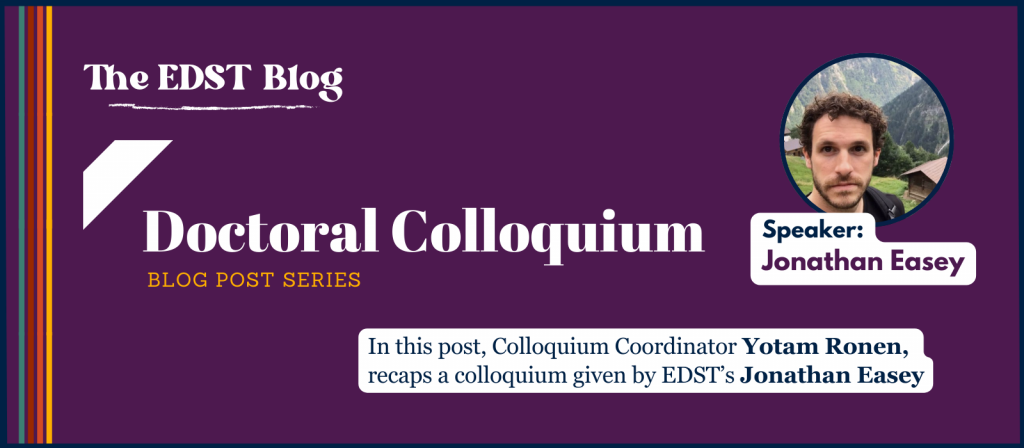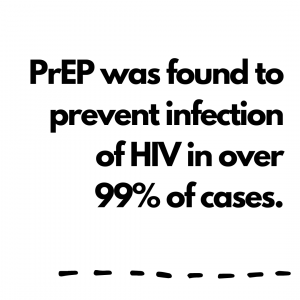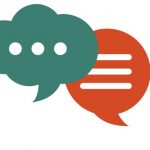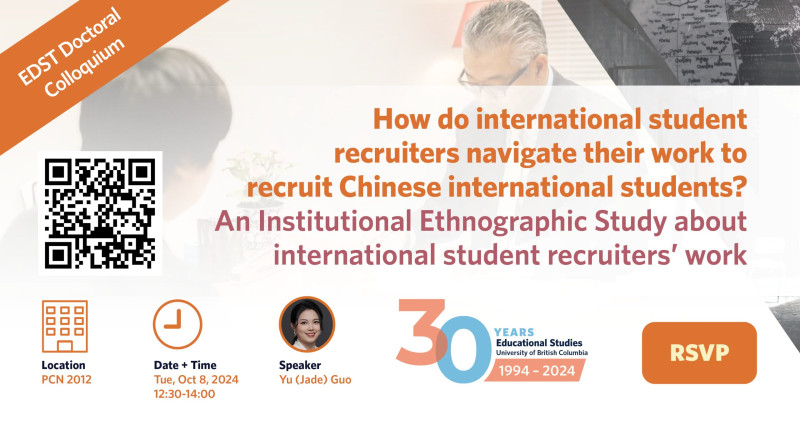
In this blog post:
Colloquium Coordinator Yotam Ronen recaps Jonathan Easey’s colloquium on improving access to HIV prevention in Vancouver. Easey’s research focuses on how queer patients can educate healthcare providers about PrEP, addressing the stigma and knowledge gaps in the system to improve care for the queer community.

How can we rise above the stigma and gaps of knowledge associated with queer health and ensure that the queer community gets the healthcare it deserves? What role does education play in the increase of awareness about PrEP among medical professional in the province?
These are the questions Jonathan Easey focuses on in his study on community learning and adult learning and its ability to increase PrEP access and prevent HIV in Vancouver.
Queer folks who are attempting to access quality healthcare in the Vancouver area face a myriad of challenges. When they seek Human Immunodeficiency Virus (HIV) prevention, those challenges are especially difficult to surpass. HIV is typically transferred through anal sex, breastfeeding, pregnancy, or the sharing of needles, and can find expression through Acquired Immunodeficiency syndrome (AIDS). While most of us associated the acronyms HIV and AIDS with the AIDS epidemic of the 80’s and 90’s, HIV and AIDS are a reality for many people in Canada, and disproportionally affect LGOTQ+2 folks, Gay, Bi-sexual, and other men who have sex with men (GBMSM), people of color, Indigenous people, drug users, and sex workers.


Over 10 years ago, PrEP, a drug that was used to treat patients with HIV, was found to prevent infection of HIV in over 99% of cases. Since then, protocols have been created to make PrEP available for those who need it, and in BC these protocols require patients to seek prescriptions from their healthcare providers once in three months.
Lack of knowledge and significant stigma among healthcare professionals mean that many people who are eligible do not have access to this drug—a troubling fact that demands significant action.
While most existing literature on the topic focuses medical professionals themselves and on identifying those professionals that would have more potential willingness to prescribe PrEp to their patients, Easey’s dissertation project aims to address this issue in a novel way—by looking at patients as potential educators on the topic of PrEP and their physicians as learners.
Since the queer community in Vancouver has significant knowledge about queer health in general and PrEP in particular—knowledge that physicians often lack—looking at the potential of patients as educators seems remarkably worthwhile.
To examine this possibility, Easey offers three interventions:
 He aims to look at oral histories of the HIV AIDS crisis in Vancouver during the 80s and 90s, to understand how advocacy from the queer community during this period had contributed to the development of policies and procedures that improve queer health.
He aims to look at oral histories of the HIV AIDS crisis in Vancouver during the 80s and 90s, to understand how advocacy from the queer community during this period had contributed to the development of policies and procedures that improve queer health.
This project is in collaboration with a team divided between Vancouver and Victoria and led by Prof. Nathan Lachowski, which collected hundreds of oral history accounts of the HIV crisis in the 80s and 90s in Vancouver and is called “AIDs in my day.” These interviews were already recorded and Easey hopes to analyze them.
The second project is theoretical and looks at power dynamics between queer patients and physicians. This project takes a look at how medical education has taken up ideas suggested by the French philosophers Pierre Bourdieu and Michel Foucault, and use those to differentiate between two types of power—discretionary power and identity power—in the context of patient-physician relationships.

The third project asks how patients and physicians characterize patients as educators and physicians as learners about PreP. This project is grounded in the field adult learning.![]()
After completing these projects, Easey aims to implement his insights through his involvement in the Public Scholars Initiative, by creating a pamphlet on queer health that will be distributed in physical as well as digital formats.
This pamphlet will give patients the tools they need to speak with medical professionals about their health needs and to increase knowledge about PrEP among the medical community. If successful, such an intervention can prove a valuable model for other communities who also experience significant barriers to access to healthcare.
In October 2023, EDST began hosting a Doctoral Colloquium. Once a month doctoral students and candidates present their research to EDST students, staff and faculty.
Check out our Doctoral Colloquium page for more. The next EDST Colloquium is:


 Share
Share